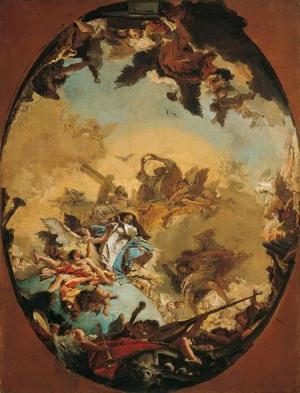| Author: | Beatrice Baskerville | ISBN: | 9781465594709 |
| Publisher: | Library of Alexandria | Publication: | March 8, 2015 |
| Imprint: | Language: | English |
| Author: | Beatrice Baskerville |
| ISBN: | 9781465594709 |
| Publisher: | Library of Alexandria |
| Publication: | March 8, 2015 |
| Imprint: | |
| Language: | English |
Until August, in the year of strife nineteen hundred and fourteen, you could find no pleasanter country house than Ruvno, Poland. It stood a little way back from the high road between Warsaw and Kutno, slightly on a hill, surrounded by pines and hardy hornbeams which guarded it, like sentinels, from the gaze of passers by. It had stood thus for centuries, ever since another Ian, Lord of Ruvno, built him a great house with the spoils of war against the Turk, laying the foundation of a hard-fighting, hard-living race, good for anything on earth but trade, always ready for a row, out of sheer love for adventure and broken heads. And of adventures they had full share, both in love and war. All the hordes of Europe passed over their land during the centuries; for Poland is Europe's eastern battlefield, as Belgium is her western. And the plows were forever turning up human bones, which lay where they fell; and human treasure, which lay where it was buried, either because the owners failed to find it when peace came again or because they happened to go where neither Turk nor Swede, Russian nor Prussian, could trouble them more. And so the domestic history of Ruvno, half fortress, half palace, filled many parchment volumes. I am not going to bore you with it; but quite recently, as Ruvno counts time, Napoleon slept there when on his luckless march to Moscow. And he supped at the large oaken table which was carved out of Ruvno oak long before the discovery of America brought mahogany to Poland. And in his clumsy, violent way, he made love to the reigning Countess of Ruvno, toasting her in that Hungarian wine which looks like liquid sunshine and makes your feet like lead. Some of the same vintage still lingered in the cellars when one smaller than Napoleon crossed the Polish borders a hundred years later. Napoleon, remembering the good cheer, paused here again to take breath on his homeward flight. But this time there was neither toasting nor courting. The Countess, in solitude, wept for her gallant husband, whose body lay at Beresina, his gay tongue frozen forever, his blue eyes staring up at the stars in the fixed gaze of death. So the great man sat at the dead one's board, silent and sullen, surrounded by the weary, ragged remnants of his staff. Those who were in Ruvno that night said that he paced his room, restless and sleepless, till daybreak. Then he went his way, no longer a conquerer, but a fugitive.
Until August, in the year of strife nineteen hundred and fourteen, you could find no pleasanter country house than Ruvno, Poland. It stood a little way back from the high road between Warsaw and Kutno, slightly on a hill, surrounded by pines and hardy hornbeams which guarded it, like sentinels, from the gaze of passers by. It had stood thus for centuries, ever since another Ian, Lord of Ruvno, built him a great house with the spoils of war against the Turk, laying the foundation of a hard-fighting, hard-living race, good for anything on earth but trade, always ready for a row, out of sheer love for adventure and broken heads. And of adventures they had full share, both in love and war. All the hordes of Europe passed over their land during the centuries; for Poland is Europe's eastern battlefield, as Belgium is her western. And the plows were forever turning up human bones, which lay where they fell; and human treasure, which lay where it was buried, either because the owners failed to find it when peace came again or because they happened to go where neither Turk nor Swede, Russian nor Prussian, could trouble them more. And so the domestic history of Ruvno, half fortress, half palace, filled many parchment volumes. I am not going to bore you with it; but quite recently, as Ruvno counts time, Napoleon slept there when on his luckless march to Moscow. And he supped at the large oaken table which was carved out of Ruvno oak long before the discovery of America brought mahogany to Poland. And in his clumsy, violent way, he made love to the reigning Countess of Ruvno, toasting her in that Hungarian wine which looks like liquid sunshine and makes your feet like lead. Some of the same vintage still lingered in the cellars when one smaller than Napoleon crossed the Polish borders a hundred years later. Napoleon, remembering the good cheer, paused here again to take breath on his homeward flight. But this time there was neither toasting nor courting. The Countess, in solitude, wept for her gallant husband, whose body lay at Beresina, his gay tongue frozen forever, his blue eyes staring up at the stars in the fixed gaze of death. So the great man sat at the dead one's board, silent and sullen, surrounded by the weary, ragged remnants of his staff. Those who were in Ruvno that night said that he paced his room, restless and sleepless, till daybreak. Then he went his way, no longer a conquerer, but a fugitive.















